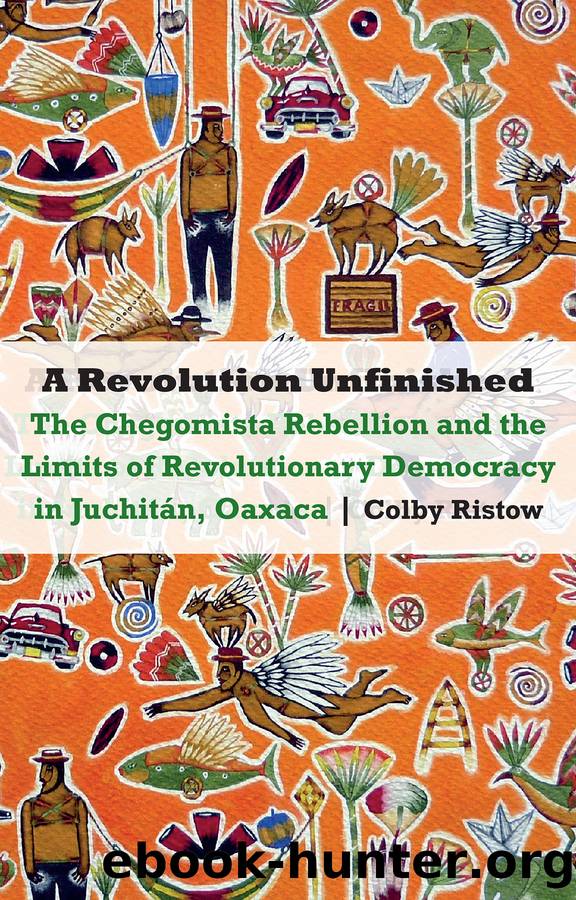A Revolution Unfinished by Colby Ristow

Author:Colby Ristow [Ristow, Colby]
Language: eng
Format: epub
Tags: HIS025000 History / Latin America / Mexico
Publisher: UNP - Nebraska
Conclusion
On Madero’s first day in office, news of the bloody events in Juchitán was making its way into national newspapers. In the coming weeks, as events in Juchitán began to dominate the national press, the Chegomista Rebellion became the Madero regime’s first national crisis—a symbol of the failure of the interim regime and a reminder that the Revolution was not yet over. Historian Stanley Ross has argued that upon assuming office, Madero was trapped between “two great forces” that threatened “to engulf the new executive”: advocates of the Old Regime, who had been allowed to regroup under de la Barra and who now controlled the legislature, the judiciary, and the army; and the elements of revolution, who “were expecting and demanding far-reaching social and economic changes.”77 However, the story told by the Chegomista Rebellion was not so simple. Madero was, indeed, trapped between the demands of pacification and revolution, but most of the advocates of pacification were not representatives of the Old Regime, nor were the demands of the revolutionaries, in their majority, so “far-reaching.” With prominent exceptions, most notably the Zapatistas in Morelos, popular revolutionaries did not call for wide-ranging, structural changes but rather for political reform—specifically, respect for popular sovereignty—that clearly fell under the ideological umbrella of the Revolution. The new regime’s failure to pacify the Revolution resulted not from its “abandonment” of radical socioeconomic reforms (which it never endorsed in the first place) but rather from its exclusion of popular revolutionaries from political office. The monopolization of public office by middle-class civilians was not inevitable, nor did it necessarily work in favor of the efficient and expedient pacification of the countryside. It was the result of decisions made by representatives of the new regime, itself constrained by the pressure of revolution.
The “orgy of political patronage” unleashed by the fall of the Porfirio Díaz complicated the practice of designating jefes políticos. After decades of being frozen out from political office, middle-class opponents of the Díaz regime lined up to demand rewards and positions from the new administration, while politicians in the national and provincial capitals consolidated their authority by building vast networks of political patronage that undergirded the electoral artifice of their “modern” liberal regime. As an appointed office, not legally subject to federal supervision or public opinion, the jefatura política was the perfect instrument by which state governors could build their patronage networks. The fixing of jefes políticos gave moderate, Maderista governors the opportunity to reward their fellow civilian oppositionists while freezing out more popular aspirants. On this score Juchitán was more the norm than the exception. As a burgeoning peripheral city, Juchitán did not lack for worthy middle-class candidates. Local professionals and politicians like Severo Castillejos and Vicente Matus had supported the liberal cause for years preceding the Revolution (while climbing the professional ranks), and clearly expected one of their own, or at least someone aligned with their interests, to be promoted to the jefatura. However, the availability of “middle-class worthies” put Juárez Maza in a
Download
This site does not store any files on its server. We only index and link to content provided by other sites. Please contact the content providers to delete copyright contents if any and email us, we'll remove relevant links or contents immediately.
| Africa | Americas |
| Arctic & Antarctica | Asia |
| Australia & Oceania | Europe |
| Middle East | Russia |
| United States | World |
| Ancient Civilizations | Military |
| Historical Study & Educational Resources |
Narcoland: The Mexican Drug Lords and Their Godfathers by Roberto Saviano(819)
07 Holiday in Death(772)
Time Among the Maya by Ronald Wright(588)
El Paso and The Mexican Revolution by Patricia Haesly Worthington(582)
The Conquest of New Spain by Bernal Diaz Del Castillo(576)
Narcoland by Anabel Hernandez(513)
Murder City: Ciudad Juarez and the Global Economy's New Killing Fields by Charles Bowden(492)
The Life and Times of Pancho Villa by Friedrich Katz(465)
Montezuma: Warlord of the Aztecs by Peter G. Tsouras(454)
Textile Fiestas of Mexico by Brautigam Sheri(422)
El Sicario: The Autobiography of a Mexican Assassin by Bowden Charles & Molloy Molly(420)
Street Democracy by Sandra C. Mendiola García(393)
Mexico by John W. Sherman(377)
Resistance, Revolution and Fascism by Anthony Faramelli(370)
General Jo Shelby's March by Anthony Arthur(349)
Drug Lord: A True Story ; The Life & Death of a Mexican Kingpin by Terrence E. Poppa & Charles Bowden(348)
The Aztecs by Michael E Smith(347)
Cantinflas and the Chaos of Mexican Modernity by Jeffrey M. Pilcher(346)
Redeeming the Revolution by Joseph U. Lenti(312)
